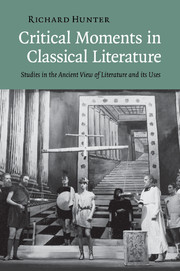Book contents
- Frontmatter
- Contents
- Acknowledgements
- List of abbreviations
- Introduction
- 1 Aristophanes' Frogs and the critical tradition
- 2 Readings of Homer: Euripides' Cyclops
- 3 Comic moments
- 4 The ugly peasant and the naked virgins: Dionysius of Halicarnassus, On Imitation
- 5 The grand and the less grand: ‘Longinus’, On the Sublime
- 6 Reading for life: Plutarch, ‘How the young man should study poetry’
- Bibliography
- Index of passages discussed
- General index
5 - The grand and the less grand: ‘Longinus’, On the Sublime
Published online by Cambridge University Press: 03 May 2010
- Frontmatter
- Contents
- Acknowledgements
- List of abbreviations
- Introduction
- 1 Aristophanes' Frogs and the critical tradition
- 2 Readings of Homer: Euripides' Cyclops
- 3 Comic moments
- 4 The ugly peasant and the naked virgins: Dionysius of Halicarnassus, On Imitation
- 5 The grand and the less grand: ‘Longinus’, On the Sublime
- 6 Reading for life: Plutarch, ‘How the young man should study poetry’
- Bibliography
- Index of passages discussed
- General index
Summary
THE FROGS REVISITED
One of the best-known and certainly most influential descendants of the Frogs is the treatise περι ὕψους, On the Sublime, conventionally ascribed to ‘Longinus’ (abbreviated to L in the present chapter) and probably to be dated to the early Empire, perhaps in fact not very much later than the work of Dionysius of Halicarnassus, though rival claims and rival chronologies are still heard; earlier chapters have often had cause to refer to this extraordinary treatise. Just as Aristophanes presents a contest between poets, as part of his own contest with other (comic) poets, so the terms of L's own agōn are set at the very beginning of the work:
When, as you know, you and I were examining together Caecilius' little work (συγγραμμάτιον) on the subject of the sublime, my dear Postumius Terentianus, it seemed to us too humble (ταπεινότερον) for the subject as a whole and not to cover what was salient, thus offering little help to the readers, which must be the principal aim of a writer. Every technical work must first define its subject and secondly, though in fact more importantly, demonstrate how and through what procedures we may achieve the end. Caecilius, however, tries through countless instances to show what the sublime (τὸ ὑψηλόν) is, as though we were quite ignorant of this, but neglected to say, perhaps deeming it unnecessary, how we might be able to develop our own natures towards some higher level of grandeur (μέγεθος). Perhaps, however, we ought to applaud the intention and effort involved in this man's work rather than fault its omissions.[…]
- Type
- Chapter
- Information
- Critical Moments in Classical LiteratureStudies in the Ancient View of Literature and its Uses, pp. 128 - 168Publisher: Cambridge University PressPrint publication year: 2009

